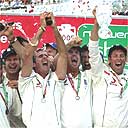Ireland Harness History to Trample England
 As chance would have it, I happened to be travelling on a flight from London Stansted (although 'Sheffield Stansted' would be almost as appropriate a name for it given its location) to Dublin on Saturday morning. Accompanying me were several hundred members of the English rugby fraternity; their pie-and-ale countenances and Barbour jackets gave them away, if their earthy banter hadn't already.
As chance would have it, I happened to be travelling on a flight from London Stansted (although 'Sheffield Stansted' would be almost as appropriate a name for it given its location) to Dublin on Saturday morning. Accompanying me were several hundred members of the English rugby fraternity; their pie-and-ale countenances and Barbour jackets gave them away, if their earthy banter hadn't already.Even as they read their morning papers, which attempted to set the scene for Saturday evening's thunderous events, they can't have known what they were walking into. On the other side of the Irish Sea a nation had been contextualising itself to a standstill, binding itself up in cultural analysis and historical deconstruction.
The country that flight FR296 landed in had been gazing so intently at its navel that it barely remembered that their visitors were looking to watch a game of rugby, not hear a history lesson.
I'm sure England's travelling supporters' eyes glanced through the think-pieces on what this game meant to the Irish and why they weren't going to rackety old Lansdowne Road this time round. But they probably spent more time worrying about whether the green shoots of their team's recovery under Brian Ashton were about to be trampled by the highly-rated Irish team.
They probably fancied that their pack would do alright, possibly dominate the scrum, but feared that they would struggle to translate their ball into points. They probably hoped for a tight game and that Wilko's boot might edge for England.
By the time half past five ticked round, however, these thoughts were lost in the noise of an occasion that inevitably transcended rugby.
For all that, as we found out against France a fortnight ago, the only satisfactory ending to these epic tales comes on the park. Where that day the volume of the preliminaries seemed like so much pointless hot air when Vincent Clerc crossed to deny Ireland the win, yesterday, pace Seamus Heaney, hope and history rhymed.
Labels: croke park, England, Ireland, rugby, six nations
....Read more!










